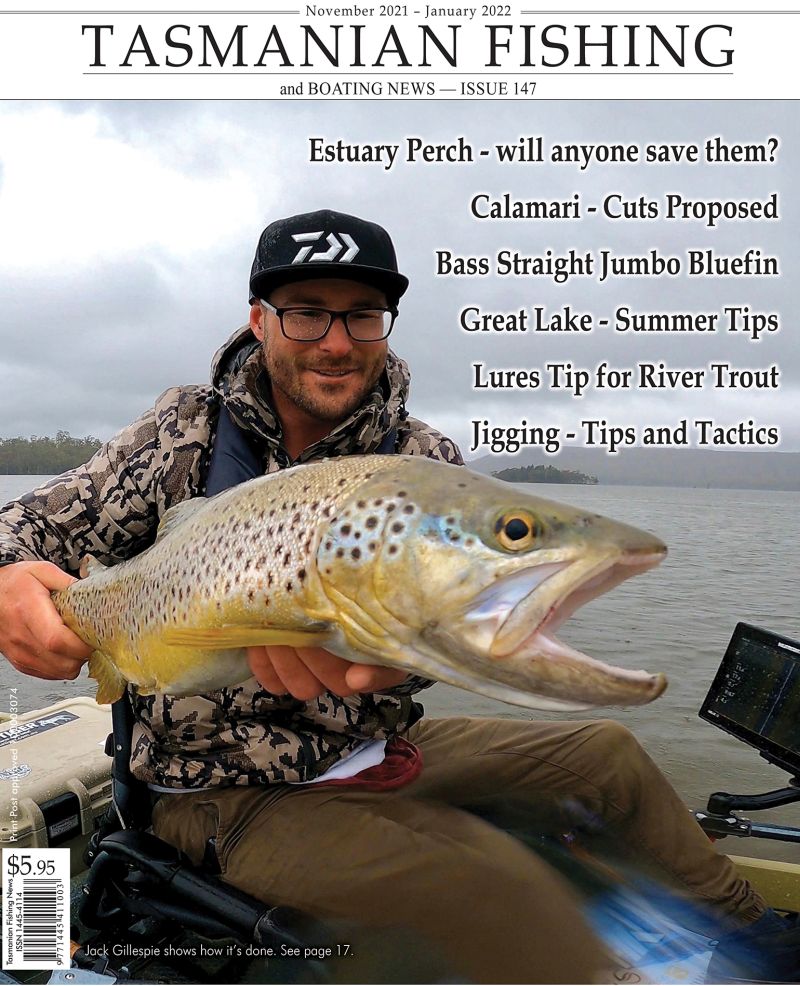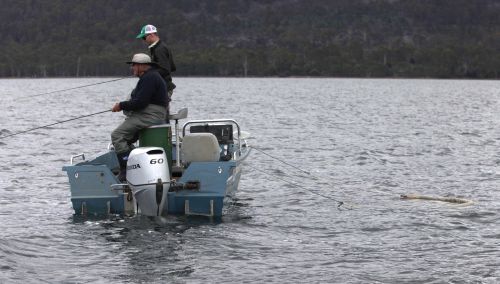What makes a Tasmanian guide?
Tasmanian trout guides have a worldwide reputation as guides of high skill and professionalism. This reputation hasn't happened by accident, as the peak body representing trout guides in Tasmania, (Trout Guides and Lodges Tasmania or TGALT) has continually lifted the bar in terms of guides qualifications and requirements for government accreditation.
While many people might think that the life of a guide is all fishing and no worries, it isn't always so. Professional guides don't fish with clients; rather they concentrate on getting the client all the best fishing. Tasmanian professional guides usually are people who have built up a vast range of fishing experience in a wide variety of techniques over a long period of time. From this extensive knowledge base they then share this wisdom with their clients in order to get them onto fish and also to have a unique Tasmanian experience.
Tasmanian guides operate on a wide variety of waters, from small streams and broad rivers, the hydro-electric impoundments of the Central Plateau to the wilderness of the back lakes. Guides also operate on estuaries and saltwater lagoons for sea trout and Atlantic salmon, as well as a number of private stillwater fisheries around the state.
Members of TGALT provide a wide range of services for their clientele; some have their own private lodge or accommodation, while others use other hotels, bed and breakfasts or public lodges to accommodate clients. Some guides pitch their business at the top end of the market, while others aim for a more mainstream angler. Most guided fishing clients are either from mainland Australia or from overseas, although many guides do have a strong local client base, as there are many Tasmanians who value the expertise and local knowledge of Tasmanian guides.
TGALT represents all professional trout guides in Tasmania, however membership is not automatic. Guides wishing to become members of TGALT must satisfy a rigorous regime of personal qualifications and business accreditations. All equipment used such as vehicles and boats must also meet statutory standards. The following outlines just what guides must have before they venture out onto the water.
Boats: All boats, irrespective of size or method of propulsion, used for guiding operations must be in commercial survey. This means that they are inspected by Marine and Safety Tasmania to determine if they are suitable for the intended purpose. The requirements for survey vary between vessel types, but in general they must be of positive buoyancy (this means they won't sink). Once in survey these vessels must be re-surveyed periodically, usually every two years. Guides operating surveyed boats must be in possession of a Restricted Coxswains Certificate, and required safety qualifications. A level two first aid qualification is also a requirement.
Vehicles: Vehicles used by guides for reward in the course of their guiding business must be licensed as public vehicles. This means that the vehicles comply with transport department standards and must also be inspected every 12 months. Vehicles and operators are also required to be accredited with Transport Tasmania. Drivers of these vehicles are required to hold an ancillary certificate with a Public Passenger Vehicle endorsement. This is required to be renewed every 12 months.
Insurance: All members of TGALT are required to have at least $10M coverage with public liability insurance. There has never been an incident where a claim has been made against a Tasmanian guide, but for professionalism and for client peace of mind all guides carry this level of insurance. Insurance is one of the largest costs for Tasmanian guides, as boats and vehicles are all required to carry public liability or third party property insurance.
First Aid: All TGALT members are required to hold at least a level two workplace first aid certificate. Guides who operate in remote areas will often have higher qualifications such as remote area first aid qualifications.
Tourism Accreditation: All TGALT members are required to hold accreditation with Tourism Tasmania. This ensures that all guided fishing clients receive a high level of service that is underpinned by a series of systems and checks.
General Services: Guides will offer clients a variety of services, including meals, morning and afternoon teas, snacks and drinks and so on. Most will supply flies, leaders and other equipment needed for the day, such as waders, rods, reels, bait where appropriate, sunscreen and waterproof clothing.
No two guides are the same - each will bring a different approach or personality to different situations. This is a key reason why the Tasmanian guiding industry is so vibrant, as many guides will have a special niche or specialisation. Member guides of TGALT are encouraged to offer a highly professional service in order to both promote Tasmania on a wider stage and also to develop sustainable and responsible businesses. TGALT members are keen participants in fisheries management issues, and are keen to see the Tasmanian fishery continue to improve and grow for the benefit of all Tasmanian anglers.



